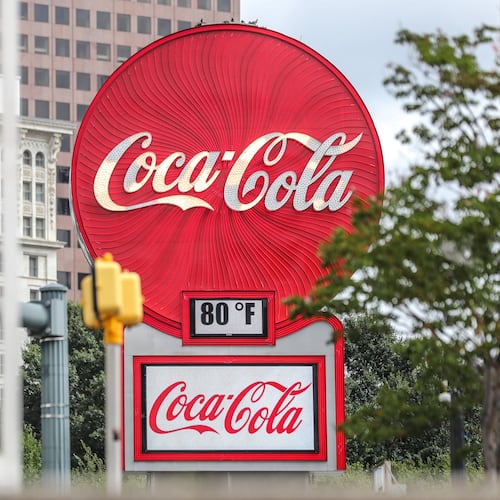Coca-Cola and an industry group face accusations in a federal lawsuit filed Wednesday that they tried to cover up links between drinking sugary beverages and harmful health effects such as obesity and diabetes.
The Center for Science in the Public Interest and the Praxis Project, a nonprofit group, sued the Atlanta beverage company and the American Beverage Association in the federal district court in Oakland, Calif.
"For years, (Coca-Cola and the ABA) have engaged in a pattern of deception to mislead and confuse the public … about the scientific consensus that consumption of sugar-sweetened beverages is linked to obesity, type 2 diabetes, and cardiovascular disease," the advocacy groups said in their lawsuit.
The groups alleged that Coke used a “sophisticated and multi-faceted” marketing plan to secretly fund biased studies to undermine research that documented harmful fallout from drinking too many soft drinks. The groups said the beverage industry also used deceptive ads aimed at children and other consumers.
A Coca-Cola spokesman called the lawsuit “legally and factually meritless.”
Coca-Cola has been facing a growing chorus of challenges to its traditional fizzy soft drinks. Several cities, universities and others have used beverage taxes, bans or other tactics to discourage consumption of the sugary drinks, arguing it’s a public and employee health issue.
The beverage industry has successfully challenged several of those efforts. An industry lawsuit scuttled a drink size limit in New York that had been championed by former mayor Michael Bloomberg.
But Coke also has been struggling with flat demand for its core soft drinks, and has responded to critics with new products that have less sugar or smaller portions.
“We take our consumers and their health very seriously and have been on a journey to become a more credible and helpful partner in helping consumers manage their sugar consumption,” said Coca-Cola spokesman Kent Landers.
He said Coke clearly labels its products’ calorie content, is reducing sugar content in many of its products, and has “transparently” disclosed its funding for research.
The Center for Science in the Public Interest has sued several companies, including Coca-Cola in an earlier lawsuit, over health issues related to their products. Last year Coca-Cola agreed to change labels on its Vitaminwater drinks to remove claims that the drink promoted health, and to disclose when sugar has been added.
The Washington, D.C.-based advocacy group sued PepsiCo last year, alleging misleading marketing of its Naked Juice drinks.
In the lawsuit against Coke and ABA, the group said Coca-Cola spent $120 million between 2010 and 2015 to fund university research and two “front groups” that claimed to be independent but published studies intended “to confuse and misrepresent the science.”
The group asked the court to require Coca-Cola and the ABA to re-tool their marketing, disclose their files on their products’ health effects, and fund a consumer education campaign on the detriments of sugary drinks.
About the Author
Keep Reading
The Latest
Featured



